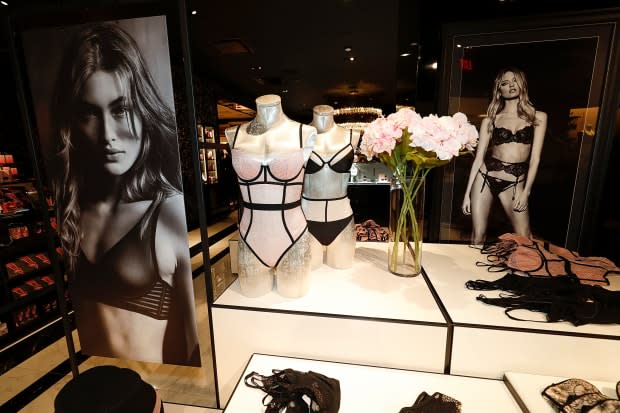Victoria's Secret CEO Admits It Has Some Catching Up to Do When It Comes to Inclusive Marketing
Uh, no duh. Plus, L Brands Chief Executive Les Wexner addresses his Jeffrey Epstein problem during the company's investor meeting.

After briefly greeting attendees of the 2019 L Brands Investor Update Meeting on Tuesday, CEO Les Wexner just dove right into it: "Before I begin, I want to just take a few moments to talk about a sensitive subject. More than a decade ago, I severed relationships with a personal financial advisor."
Without naming the late sex offender Jeffrey Epstein, Wexner went on to condemn his "unexplainable, abhorrent behavior" while also repeatedly emphasizing how long ago they severed ties. In a bold move, the billionaire also attempted to make the situation appear relatable to those listening.
"Maybe some of you can relate to this in a positive way, but at some point in your life, we are all betrayed by friends, and if we haven't, we're really fortunate to have lived a perfectly sheltered life. But at the end of the day, people who have secret lives have secret lives and because they're secret and they're so good at hiding those secrets, so many people are taken advantage of or can be in contact with people who had that kind of peculiar behavior," he continued, concluding: "Being taken advantage of by someone who was so sick, so cunning, so depraved is something that I'm embarrassed that I was even close to, but that is in the past."
Even though Epstein did use his connection to Victoria's Secret to facilitate his predatory behavior (which Wexner failed to address), perhaps there's a scenario where their relationship could simply be forgotten as something that happened a long time ago; in this case, however the executive in question is and was running a lingerie company known for its sexualized marketing — marketing with a clear male gaze that has long since since fallen out of step with today's consumer. Marketing orchestrated by a very public-facing former CMO who once proudly rebuked the idea that anyone other than the thin, young, cisgender, traditionally attractive women it's always cast should be allowed to model its product.
About a month ago, Victoria's Secret finally announced that said CMO, Ed Razek, would be leaving. And the company seems to be starting to work towards correcting his mistakes — not to mention, reverse ongoing declines in profits and sales.
John Mehas, newly appointed CEO of the Victoria's Secret brand, spent most of his part of the presentation talking about how the brand was working to improve and modernize product, especially bras, through "innovation." It's also beginning to collaborate with third-party brands, like Los Angeles-based For Love and Lemons. The presentation cut to a "behind the scenes" video of a shoot for the For Love and Lemons lingerie collection starring models like Grace Elizabeth, Winnie Harlow and Devon Lee Carlson alongside, well, one curvy girl. But compared to the typical Victoria's Secret fare, it looked notably diverse and authentic.
Mehas was vague about the brand's plans to evolve its own marketing, saying only that the company was "reevaluating" its annual runway show, and that we would see a "refreshed brand experience that celebrates Victoria's Secret as a brand by her for her," those last four words emblazoned against a pink background on their own presentation slide. Later, when an audience member asked Mehas to elaborate on the brand's marketing plans, Mehas brought up the For Love and Lemons video as being a "north star" for where it's going. "You'll start to see an evolution," he offered.
"Amy is a little further ahead than we are at VS," he also said, referring to Amy Hauk, CEO at Pink. Her presentation, which centered around the brand's initiatives around female empowerment and its "grl pwr" (do the Spice Girls have a trademark on the version with vowels?) messaging, felt much more modern, with visuals featuring models and real girls of all shapes and sizes wearing Pink's lingerie and loungewear. Notably, Pink also recently hired its first transgender model.
Also perhaps notable: The brand that's "further ahead" in appealing its marketing to women is run by a woman. Asked by another audience member why a woman was not hired to run Victoria's Secret following the departure of Jan Singer late last year, Wexner replied, "We don't want to be discriminating." Mehas then made a joke of it, saying, "I don't know if I can talk about [the brand], being a man."
While both brands are struggling to grow sales and profits and offer returns for investors, they still have the largest share of the lingerie market. On average, according to CFO Stuart Burgdoerfer, 400 million people visit Victoria's Secret stores each year, while one billion visit its website. Try as they might, it will be difficult for the brand's many competitors to take a significant chunk of its market share, especially if it's successful in improving product and bringing its marketing practices into the modern age.
Never miss the latest fashion industry news. Sign up for the Fashionista daily newsletter.
